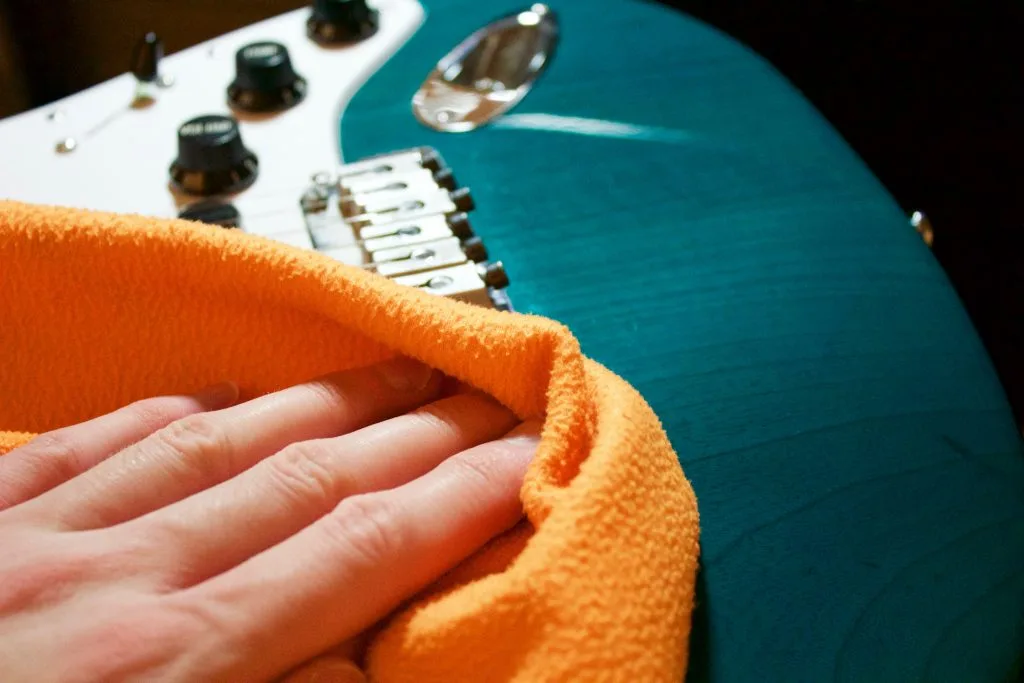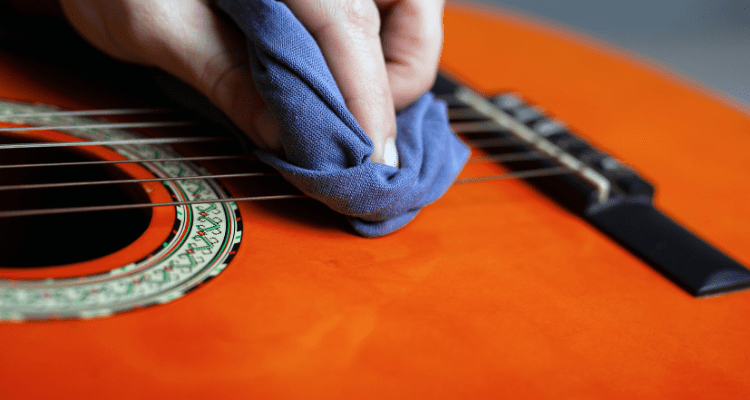As a guitar player, you know the importance of keeping your instrument in good condition. A well-maintained guitar not only sounds better but also lasts longer. But when it comes to cleaning your guitar, there are so many different techniques and products out there that it can be overwhelming and confusing. You might be wondering, what’s the best way to clean my guitar? How often should I do it? What products should I use?
Well, fear not! In this article, I’ll share with you some insider tips and tricks from professional musicians on how to properly clean your guitar. From basic maintenance to deep cleaning techniques, we will cover everything you need to know. So grab your favorite axe and let’s get started on making sure it stays shiny and plays like a dream for years to come!
So, how to clean your guitar?
Cleaning your guitar is an essential part of maintaining its sound and appearance. Not only does it help prolong the life of your instrument, but it also ensures that you are getting the best possible sound every time you play. While there are many different methods and products available for cleaning guitars, here are some tips and tricks from the pros to help you keep your guitar in top shape.
1. Use a soft cloth: When wiping down your guitar, always use a soft cloth or microfiber towel to avoid scratching the surface. Avoid using paper towels or rough cloths as they can leave behind small scratches on the finish.
2. Clean after each use: It’s important to get into the habit of cleaning your guitar after each use. This will prevent any dirt, oils, or sweat from building up on the strings and body of your guitar.
3. Use a damp cloth for basic cleaning: For regular maintenance, a slightly dampened cloth is all you need to wipe down your guitar’s body and strings. Make sure not to get any water near the electronics or inside the soundhole.
4. Invest in specialized cleaners: If you want to give your guitar a deeper clean, there are specialized cleaners made specifically for guitars that can effectively remove built-up grime without damaging the finish.
5 . Don’t forget about fretboards: Fretboards require special attention when cleaning as they can accumulate dirt and oil from playing over time. Using lemon oil or other fretboard conditioners will not only clean but also hydrate and protect them.
6 . Be gentle with hardware: When cleaning around hardware such as tuners and bridge pins, be careful not to apply too much pressure as this could cause damage.
7 . Protect with polish: After giving your guitar a thorough clean, applying polish can add an extra layer of protection against fingerprints and smudges while giving it a shiny finish.
8 . Store properly: Proper storage is key to keeping your guitar clean. Make sure to keep it in a dry and cool place, away from direct sunlight or extreme temperatures.
By following these tips and tricks from the pros, you can ensure that your guitar stays in top condition for years to come. Regular cleaning not only keeps your instrument looking and sounding great but also shows respect for the craft of music-making. So take care of your guitar, and it will continue to bring joy and beautiful music into your life.
Understanding the Importance of Regular Guitar Cleaning
Regular guitar cleaning is a crucial aspect of instrument care that many musicians might overlook. When a guitar is played, it collects dirt, sweat, and oils from our fingers. Over time, these residues can lead to build-up that not only affects the appearance but also the sound quality. A clean instrument enhances performance, allowing for clearer tones and brighter notes. Keeping your guitar in top shape ensures its longevity and makes each strum feel satisfying. Regular maintenance prevents unnecessary repairs down the line while preserving the wood’s natural beauty.
Cleaning your guitar doesn’t have to be complicated; it can easily become part of your routine after playing. Start by using a soft cloth to wipe down the strings and body before putting it away; this simple act removes grime and helps maintain shine.
You may want to consider using specific products designed for guitars instead of household cleaners which could potentially harm the finish.
Also, remember to check the fretboard and bridge areas where dirt often hides—cleaning those spots regularly keeps them safe from wear.
Ultimately, taking just a few moments after each session not only protects your investment but also deepens your connection with music as you care for your beloved instrument.

Read also: how many scales are there on guitar
Choosing the Right Cleaning Materials for your Guitar
When it comes to taking care of your guitar, the right cleaning materials can make all the difference. For a shiny finish and smooth strings, look for gentle cleaners specifically designed for instruments. Products such as guitar polish help maintain that beautiful sheen while protecting the wood from unnecessary wear. Avoid using household cleaners like window spray or multi-surface options, as these can harm the delicate finish and fretboard. Instead, opt for microfiber cloths; they are soft enough not to scratch yet effective in lifting dust and fingerprints off your instrument without leaving behind scratches.
In addition to polishing solutions, consider using specific fretboard cleaners when tackling grime on this often-overlooked area. These products are specially formulated to break down oil and dirt buildup without damaging the wood or any finishes present. A few drops of lemon oil or a dedicated fretboard conditioner can breathe new life into aged woods while nourishing them at the same time. Remember always to have some string cleaner on hand too! It keeps your strings fresh and bright-sounding longer by reducing corrosion from sweat and oils during playtime.
By carefully selecting what you use on your guitar, you ensure that it stays looking great while sounding its very best!
Step-by-Step Guide to Daily and Deep Cleaning Your Guitar
Cleaning your guitar is essential for maintaining its beauty and sound quality. Start with a daily cleaning routine to keep dust and fingerprints at bay. After each use, gently wipe down the body, neck, and strings with a soft microfiber cloth. This simple act removes oils from your fingers that can dull the finish over time. When you notice dirt build-up on the fretboard or around the pickups, use a slightly damp cloth to remove it without damaging any wood finishes. For extra care, consider using a specialized guitar polish once in a while to enhance that shiny look.
For deeper cleaning sessions—perhaps monthly or quarterly—take time to give your instrument some extra love. First, loosen the strings but don’t remove them completely; this helps maintain tension on the neck while you work. Use lemon oil on a clean cloth for wooden fretboards; it nourishes the wood while removing grime effectively. If there’s significant gunk buildup, you might opt for an old toothbrush (just be sure it’s clean!) dipped lightly in soapy water for scrubbing hard-to-reach areas like frets or tuning pegs. Always remember to dry everything thoroughly afterward; moisture can lead to unwanted damage.
Lastly, check your hardware: tighten any loose screws and replace worn-out strings as needed!
Safeguarding Your Guitar: Extra Tips for Maintenance and Care
Taking care of your guitar is like nurturing a beautiful plant; it needs attention and love to thrive. First off, keeping your guitar clean is essential. Regularly wipe down the strings and body with a soft cloth to remove sweat, dirt, and oils from your hands. This simple act can prolong the life of both the strings and the finish. Additionally, consider applying a specialized lemon oil or polish designed for wood instruments to maintain its shine while also protecting against scratches.
Don’t forget about proper storage! When you’re not playing, use a sturdy case or stand that will keep it safe from bumps and falls.
Another important aspect of maintenance involves checking the setup regularly. Changes in temperature or humidity can affect how your guitar plays. Make sure you check the neck relief by pressing down on the first and last frets; if there’s too much bowing or straightness, adjustments might be needed. You should also pay attention to string height: if they’re too high or low, playing becomes difficult! Lastly, always change your strings after several sessions—fresh strings sound brighter and feel better under your fingers.
Taking these extra steps ensures that your musical companion remains in top shape for many years of strumming ahead!
You may also like: What guitar does Chris Stapleton play
Conclusion: Enhancing Your Guitars Performance Through Proper Cleaning
Keeping your guitar clean is a vital part of ensuring its performance remains top-notch. Just imagine the joy of strumming a pristine instrument, where every note resonates beautifully. Over time, dirt, dust, and oil from your fingers can accumulate on the strings and body. This grime not only dulls the shine but can also diminish sound quality. Regular cleaning helps maintain that bright tone that makes playing so enjoyable. A soft cloth to wipe down the body after each session will do wonders to keep it looking fresh and help prevent wear.
Another important aspect is taking care of those strings! Changing them regularly is essential for maintaining clarity in your music. You might consider using specialized string cleaners or simply some mild soap with warm water to remove buildup without damaging anything. Additionally, keep an eye on areas like the fretboard where grime tends to hide; using a little lemon oil or conditioner specifically made for guitars can bring back its natural luster while protecting it from drying out over time.
By incorporating these simple practices into your routine, you’re not just preserving an object; you’re nurturing an instrument that holds countless memories waiting to be created anew!

